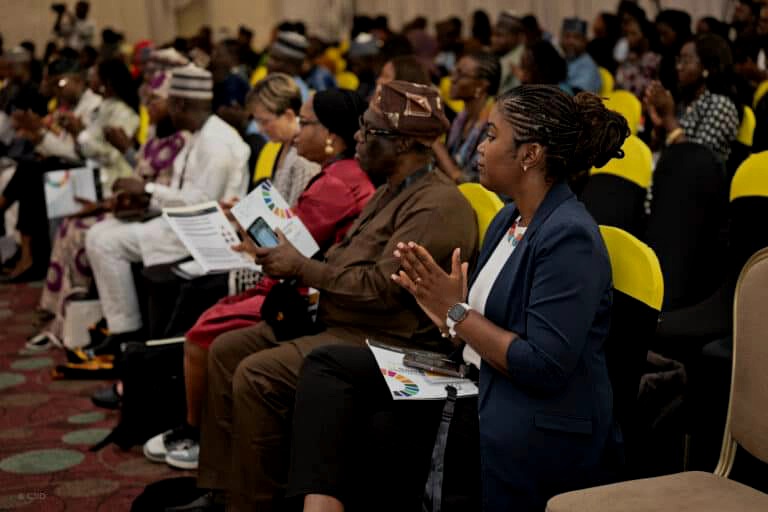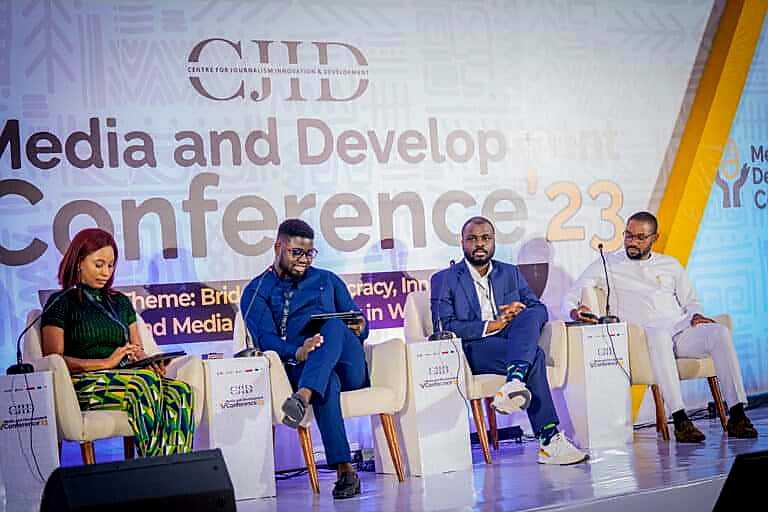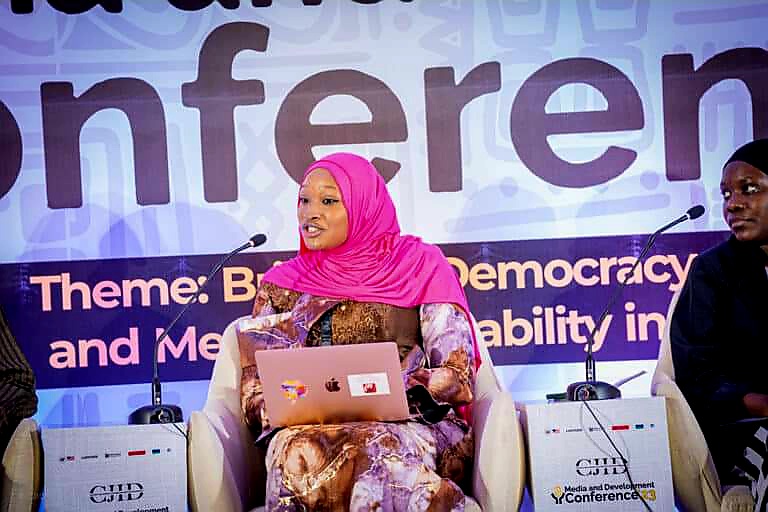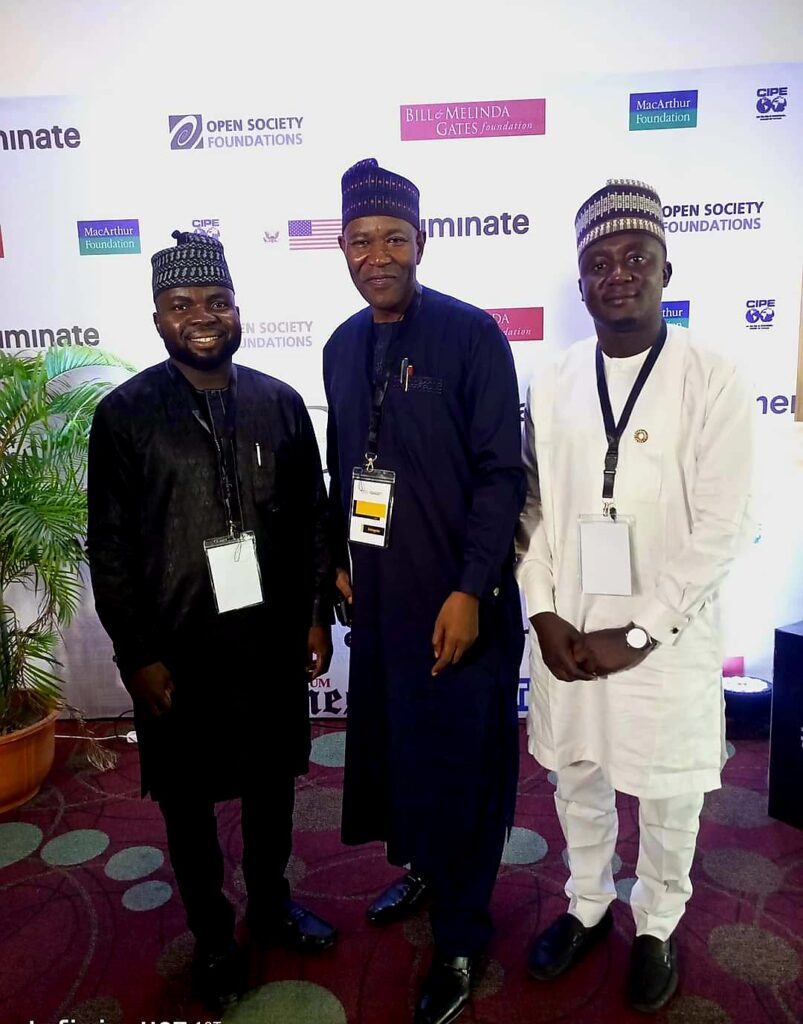Journalism as a business or social activism? A perspective on CJID’s Annual Media Conference
The appointment of media practitioners at the prime of their career as media aides and the issue of compromise, concerns on the rise of media distortion by the media, narrative reporting on maternal and health issues, the digital evolution and more became hot topics for introspection.
A media and communications expert, Shakirudeen Bankole, shares deep insights, perspectives and takeaways from the conference.
By Shakirudeen Bankole
The highpoint of the month of November 2023, for me, was the opportunity to attend the maiden edition of the Centre for Journalism Innovation and Development’s Annual Media and Development Conference (#DEVCOM2023), held between Monday and Tuesday, November 13-15, 2023.
The event brought together experts from.across different spectrums of professions.
Journalists, Media and Communications Experts, Editors, Newsroom Managers, Medical Doctors,.Journalism Lecturers, Policymakers, Professors, and Researchers, all gathered to discuss.

They were interested in reassessing the interconnectedness of these institutions in the quest to serve the public better and uphold the sanctity of the fourth estate of the realm as a social activism concept cum business initiative.
The conference had seven Thematic Areas, and were expertly handled by topnotch professionals and moderators. The areas were;
Media and Gender; Universal Health Coverage; Social Accountability, Climate Change, Digital Tech and AI, Conflict, Security, and Human Rights, and Media Sustainability. T
With 15 panel sessions, there were intellectually stimulating discussions that activated the subconscious minds of the attendees into thinking innovatively on how to approach their jobs and solve many of the country’s sociopolitical challenges.
My summation of the experience is that #DEVCOM2023 was a one year intellectually intense degree programme, compressed into fewer days of marathon learning and developmental conversation. @CJID should please forward my certificate! Lol
There wee many @highlight s at the parley. One that easily came to mind was the brilliant but somewhat unsettling submission by the Special Adviser to the President Asiwaju Bola Ahmed Tinubu on Economic Affairs, Office of the Vice President, Dr. Tope Fasua.

ECONOMIC INEQUALITY
Fasua, while discussing on the widening Economic Inequality between the rich and the poor in Nigeria and Africa, spoke blazingly on “continuous empowerment of self” as the only antidote.
He believes acquisition of valuable and competitive skills is one that should be prioritized and even evangelised across the four walls of our learning institutions before standing a chance against the fang of poverty and the associated challenges.
Oga forgot to dwell more on the statutory obligation of government to establish these skill acquisition programmes/centres, expand the existing ones, partner existing institutions, in addition to creating opportunities and influence redistribution of wealth through the creation of enabling environments for these skills to thrive.
The same model is what China and India has been deploying to catapult hundreds of millions of its young population out of poverty, and thereafter becoming net exporters of skilled workforce to the world.
It is needless.to say the necessity for skill in a society with less attractive reward system.flr same skill. This perhaps explains the unabated brain drain Nigeria and most African countries have been facing.
MATERNAL AND CHILD MORTALITY
Another provoking highpoint for me was the issue of Nigeria’s troubling statistics on Maternal and Neonatal Mortality. It was said that this beautiful country sits at the zenith of global ranking on this bad indices.
Data show that over 223 women die every day while bringing forth another life.

The reason is either lack of standard medical facility, trained and experienced doctors, and or the affordability of the service.
Ironically, in our aggressive approach to sustaining reproduction, Nigeria accounts for 8milliom babies born every year according to UNICEF. The ministry is booming, yes.
The breakdown of this.figure indicate that out of the 250,000 childbirth every year in the country, 81,395 women will die in the process. 3000 children will also doe due either because of lack of medical facilities, treatment, or it affordability of the either.
“The simple reason why women are dying while trying to bring life forth is because the society does not really care about them. Until we begin to show a sincere duty of care by investing heavily and strategically in public health institutions and the expertise of the medical doctors, we would continue to seem that we don’t really value the lives of our women,” Dr. @Adaeze Chidinma Oreh, the Honourable Commissioner for Health, Rivers State.
The moderator, Dr. Chioma Nwakama-Akanno, Founder, Smile With Me Foundation, likened the Nigeria’s maternal mortality rate to “a daily brain crash with all passengers perishing.”
But innovation in the public healthcare sector does not necessarily mean reinventing the wheel,.it also means opening of the mind to doing things differently for better results, ” Dr. Raihanah Ibrahim, Principal, Solima Centre for International Development and Research, added.

INTERLUDE
Now, lets forget about the hard part.
In this introspection, I want to intentionally document two important events and explain why they matter.
First, the traveling experience which almost reunited me and my father earlier than envisaged. And second, the welfare of the Nigerian Journalists and the health of the Media Business in Nigeria.
THE MAYDAY SCARE
We arrived Abuja on Sunday, 12 November 2023 aboard Aero Contractor Airline (Cally). My return ticket to Lagos was booked for same flight by 3:30pm of Wednesday.
Without mincing words, our flight experience enroute Abuja was not a pleasant one.
At about the altitude of 30,000kms above the sea level, the Chief Pilot announced of an impending “10minutes turbulence” that would disrupt the normal cause of piloting the airplane, causing our plane to intermittently oscillate and nosedive at alarming speed before it problematically (crash) landed at the Nnamdi Azikiwe International Airport.
Landing off the tamac, running a fully loaded airplane into a marshy untired surface was not a scary thing of course, afterall it was still the airport environment.
What was scary however was the event leading up to the landing itself. After we had a noisy and rocky landing ,with a sudden stop that stretched our seatbelts and had many heaved a huge sign of relief, we were greeted by a dozen of fully kitted firefighters with three loaded trucks, ready to battle fire!
“Excuse me, what was this for,” one of us asked, halve mindedly. “You guys need to hurry into the bus, the place can catch fire any moment. That is why the firefighters are positioned,” the co-bus driver conveying us to the arrival session, replied her, sending chills down the spine of many of us hitherto brave men!
In a minute, the news of the landed spread like weird fire..Online News platforms feasted on it before the carcass were properly embellished and followed up on the conventional newspapers the following day.
“Aero Contractor Airline crash-landed in Abuja;” Another Airline Crash-landed in Abuja, blah blah blah.
The news prompted the Managing Director of the airline, Captain Sanusi
event made the headline before After making the said announcement, the pilots went in to absolute silence. The air hostesses also disappeared from site. Nobody was allowed to move around, even to go and ease yourself.
The absolute silence aboard lasted a long 30 minutes! We were suppose to have landed 20 minutes into the funny oscillation and maneuvering. Hence people were apprehensive but quiet. My
It was widely reported in the news that the airplane, fully loaded with 133 passengers, including my erudite Prof, Tunde Akanni
at the Abuja Intercontinental Hotel, formerly known as the Sheraton Hotel.
It was the maiden edition of it annual Media and Development Conference. And as such, delegates were drawn from.across the spectrum of frontline institutions. Journalists, Communications Experts, Medical Doctors, Researchers, University Lecturers, Policymakers, Newsroom Managers, and a host of others.
HEALTH OF MEDIA BUSINESS IN AFRICA TODAY
The question about whether or not or how healthy it is for Journalism to function as both a social activism.concept and business enterprise in Nigeria today can not be overemphasized.
No matter the seeming conspiracy of silence or blame game around the topic, the need to sincerely look at the issues, with the intent to establish whether Journalism.should.function seperately as a Business Enterprise or maintain its conceptual identity of Social Activism, will not go away.
As a caveat, I have been a Journalist and Communication Expert all my life. And this is an unattended issue that has continued to contribute to the shaping of many journalists’ lives and their families’.
At the #devcom2023 one of the participants, opened asked a question that underscore the troubling future awaiting this noble profession, if everyone continue to pretend all was well.
Here was his question:
” In the last 11 months, I have changed three jobs, jumping from one newsroom.to the other in search of a decent paying journalism work. But instead of encountering luck, my life has not changed for good. In fact, I have become poorer and poorer each time I moved. This is because each of my employers end up not been able to pay me my salary, even after delivering the worl.. My question therefore.is, did I make a mistake by opting for journalism as a career while going o the university? Am I responsible for my economic woes or my employers, or even the country?” the questioner asked, with a plead that his names and identity be concealed from the public, to prevent him being victimised by his previous and current employers.
The audience, mostly Journalists, instead of interrogating the troubling question, busted into laughter. Some of them halve-mindedly admitted the affliction that has been responsible for their economic stagnation for years.
“Journalism is not a poor profession. The statement that journalists are not meant to be rich is a fallacy. The very first day I decided to embrace journalism, I spoke affirmatively that I was going to be a successful one. Since then, I have been a successful Journalist, Researcher, and Academia Inshaa Allah..” Professor Umaru pate(Kaigama Adamawa), Chairman NJID Board of Trustees, encouraged the young Journalism.
Of course, the question was a beautiful lead on the topic of discussion at the panel sessions moderated by Akintunde O. Babatunde , CJID Director of Programmes. The session was originally to be handled Busola Ajibola , CJID Deputy Director.
Babatunde interrogated the question further by conducting a quick survey from the audience to know how many of them have had a paid subscription for news content in the last five to 10 years. Out of the multitude of over 250, barely five to 10 were able to raise their hands boldly.
“The result of this crash survey petfectly underscores the challenge of survival for media organisation as a business in the third world countries where public literacy on funding the business is very low due to widespread poverty,” he said.
As a Communication Consultant, I have been working with Journalists, Editors, and Newsrooms across five of the six geopolitical zones of the country.
From the North-West, North-East, North-Central, South-East and South-West, my participatory and non-participatory observations are:
“Journalism in Nigeria and West Africa is at an existential crossroad. There is a dilemma to decide with it should function as a social activism body or find a footing as a full scales business and profit-oriented body.”
The above summation seem simple until other variables are contextualized into it. If it is going to fiction as.a social activism concept, there would be need to provide resources to power the initiative. This would be in form of office structure, administrative staff, editorial staff, application in case you are.relying on AI, gadgets, and sustainable payment of remuneration for man-hours through salaries, wages, or grants.
The missing puzzle above has already been found and fixed by the global south, with their societies now boasting of multiple alternative sources of funding for social activism style of Journalism, the only and true journalism that can drive social change and hold public officials and institutions accountable.
Journalism can not continue to want to function as a Business Initiative, with expectation of generatie revenues from advert and sales without compromising on its conceptual ethos of integrity and objectivity.
Ajibola Amzat ,Africa Editor for Center for Collaborative Investigative Journalists, said “the problem is much deeper than that meets the eyes.
According to him, the Media Capture is an unrelenting project being aggressively funded by the ruling class and elites. There have been different methods and ways to permanently water down or pocket the blazing fire from the pen of the Journalists in Nigeria and Subsahara West Africa.
“The culture of appointing practicing journalists in their prime as spokesperson of elected government officials is the height of it. It is a strategic affront to continue to suppress the media. The spokespersons are formerly news people. They are knowledgeable in the workings of the newsroom. They are now employed to do the bidding of the government officials. It is not hard to imagine the depth of damage they will do to the editorial independence of such a media organisation,” he added.





Comments